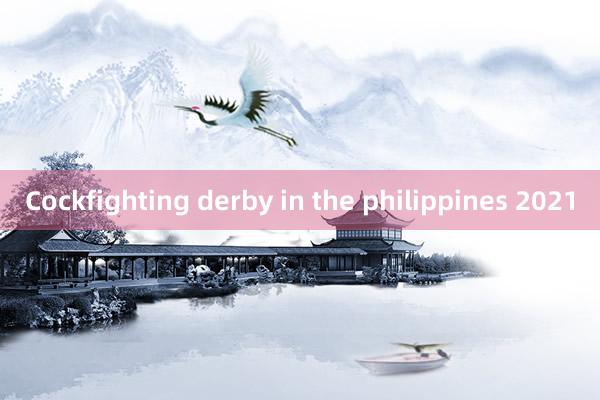
Cockfighting Derby in the Philippines 2021: A Cultural Tradition in the Spotlight
Cockfighting, known locally as "sabong," has long been a part of Filipino culture, with roots tracing back hundreds of years. It is more than just a form of entertainment; for many Filipinos, it is a tradition deeply embedded in their way of life. In 2021, this controversial yet popular pastime faced new challenges as the Philippines, like the rest of the world, grappled with the effects of the COVID-19 pandemic.
Sabong has been a part of Philippine society since before the arrival of Spanish colonizers in the 16th century. Early accounts from explorers and historians describe cockfighting as a widely practiced sport among the indigenous population. It was so ingrained in the culture that even Spanish colonizers, who brought Catholicism to the islands, embraced and regulated the practice instead of banning it. The sport quickly became popular across different social classes, from common folk to the elite.
The structure of a cockfight is simple but intense. Two specially bred and trained gamecocks, often fitted with razor-sharp blades attached to their legs, are pitted against each other in an enclosed cockpit. Spectators, driven by adrenaline and excitement, place their bets on the outcome, making cockfighting not only a sport but also a major betting event in the Philippines.
For many Filipinos, sabong is not just a pastime; it’s a way of life. The breeding, training, and fighting of gamecocks have created a whole subculture in the country, with many enthusiasts dedicating their time and resources to raising these birds. Breeders, known as "sabongeros, Hướng Dẫn Sử Dụng Link Vào K8 Mới Nhất_ Trải Nghiệm Và Cập Nhật" take pride in producing champion cocks, Tìm Hiểu Về Link Vào Nhà Cái W88_ Những Điều Cần Biết often seen as a symbol of status within their communities.
Local derbies, Bộ phần mềm học tiếng Việt BC Nhớ Lần Mới BC - Học Tiếng Việt một cách thú vị và hiệu quả where multiple matches are held in a single event, draw large crowds. The biggest and most prestigious events are national derbies, such as the World Slasher Cup, held annually at the Araneta Coliseum in Quezon City. These events can draw thousands of attendees, and the stakes can be incredibly high, with millions of pesos wagered on the outcome.
In 2021, like many other public events, cockfighting was heavily impacted by the COVID-19 pandemic. With lockdowns and restrictions on mass gatherings, many traditional cockfighting arenas were forced to close. The government imposed strict measures to curb the spread of the virus, which included prohibiting large crowds in public spaces. For an event that thrives on spectators and live betting, this was a significant blow.
go88 comHowever, the pandemic also led to the rise of "e-sabong," or online cockfighting, where enthusiasts could place bets and watch matches live-streamed from various arenas. While e-sabong offered a temporary solution, it also highlighted the growing concern over the unregulated nature of online gambling. The government, while initially reluctant, eventually began to regulate e-sabong, recognizing its potential to generate revenue during a time when other sectors were struggling.
The rise of e-sabong in 2021 also sparked a debate over the ethics of cockfighting. Animal rights activists have long argued against the sport, citing the cruelty inflicted on the animals involved. The online version, while convenient for participants, did little to address these concerns. The lack of physical attendance did not reduce the violence inherent in the sport, leading to further calls for reform or even an outright ban on cockfighting in the country.
Despite the controversy, cockfighting remains a significant part of the Filipino economy, especially in rural areas where it is a major source of livelihood. From breeders and trainers to vendors selling food and drinks at cockfighting arenas, the sport supports a wide network of individuals. The betting that takes place also circulates money within local communities, further contributing to its economic impact.
For many, the debate around cockfighting is not just about animal welfare or the ethics of gambling but about preserving a cultural tradition. Sabong is seen by its supporters as a link to the past, a tradition that has been passed down through generations. They argue that the sport, when regulated properly, can coexist with modern society without compromising animal welfare or public health.
As the world continues to adjust to life after the pandemic, the future of cockfighting in the Philippines remains uncertain. While e-sabong has shown that the sport can adapt to modern technology, questions about regulation, ethics, and its place in Filipino culture persist. The government faces the challenge of balancing the economic benefits of the sport with the growing pressure to address concerns raised by animal rights groups and gambling reform advocates.
In 2021, the world of sabong underwent significant changes, but its deep roots in Filipino culture suggest that it will continue to play a role in the country's social fabric. Whether through traditional derbies or digital platforms, cockfighting remains a symbol of both the resilience and the challenges faced by a nation navigating the complexities of tradition and modernity.
jili appswww.mairieaussevielle.com